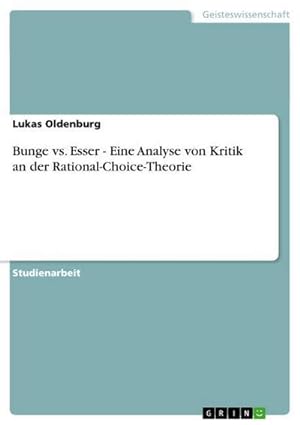Lukas Oldenburg (4 results)
Product Type
- All Product Types
- Books (4)
- Magazines & Periodicals
- Comics
- Sheet Music
- Art, Prints & Posters
- Photographs
- Maps
-
Manuscripts &
Paper Collectibles
Condition
- All Conditions
- New
- Used
Binding
- All Bindings
- Hardcover
- Softcover
Collectible Attributes
- First Edition
- Signed
- Dust Jacket
- Seller-Supplied Images
- Not Printed On Demand (2)
Seller Location
Seller Rating
-
Bunge vs. Esser - Eine Analyse von Kritik an der Rational-Choice-Theorie
Published by GRIN Verlag Jul 2007, 2007
ISBN 10: 3638639754ISBN 13: 9783638639750
Seller: BuchWeltWeit Ludwig Meier e.K., Bergisch Gladbach, Germany
Book Print on Demand
Taschenbuch. Condition: Neu. This item is printed on demand - it takes 3-4 days longer - Neuware -Studienarbeit aus dem Jahr 2002 im Fachbereich Philosophie - Theoretische (Erkenntnis, Wissenschaft, Logik, Sprache), Note: 1,0, Europa-Universität Viadrina Frankfurt (Oder), Veranstaltung: Rationalitätstheorien, 18 Quellen im Literaturverzeichnis, Sprache: Deutsch, Anmerkungen: Vorstellung des Rational-Choice-Ansatzes von Hartmut Esser, Analyse von Kritik Bunges an Rational-Choice-Theorien generell, Vergleich von Kritik und tatsächlicher Theorie. , Abstract: For many years now, MARIO BUNGE has adamantly been criticizing rational choice theory for various reasons. While HARTMUT ESSER, a strong advocate of the theory, stresses its applica-bility and usefulness in any form of social science as well as its basic simplicity, BUNGE and other opponents of rational choice consider it to be empty, inapplicable and even pseudoscientific, mainly because of its excessive generality. The objective of this paper is to take a closer look at both an enhanced and modern version of a rational choice model (i.e. ESSER s) and BUNGE s criticism of rational choice theory in general. This way, we will be able to judge where BUNGE s reproaches do apply and where they don t. It will be shown that BUNGE doesn t take into account essential parts of the theory whereas in many points his criti-cism is indeed justifiable. This examination will concretize the viewpoint for a short conclud-ing look at whether and how rational choice theory can be useful for science. 28 pp. Deutsch.
-
Bunge vs. Esser - Eine Analyse von Kritik an der Rational-Choice-Theorie
Published by GRIN Verlag, 2007
ISBN 10: 3638639754ISBN 13: 9783638639750
Seller: AHA-BUCH GmbH, Einbeck, Germany
Book
Taschenbuch. Condition: Neu. Druck auf Anfrage Neuware - Printed after ordering - Studienarbeit aus dem Jahr 2002 im Fachbereich Philosophie - Theoretische (Erkenntnis, Wissenschaft, Logik, Sprache), Note: 1,0, Europa-Universität Viadrina Frankfurt (Oder), Veranstaltung: Rationalitätstheorien, 18 Quellen im Literaturverzeichnis, Sprache: Deutsch, Anmerkungen: Vorstellung des Rational-Choice-Ansatzes von Hartmut Esser, Analyse von Kritik Bunges an Rational-Choice-Theorien generell, Vergleich von Kritik und tatsächlicher Theorie. , Abstract: For many years now, MARIO BUNGE has adamantly been criticizing rational choice theory for various reasons. While HARTMUT ESSER, a strong advocate of the theory, stresses its applica-bility and usefulness in any form of social science as well as its basic simplicity, BUNGE and other opponents of rational choice consider it to be empty, inapplicable and even pseudoscientific, mainly because of its excessive generality. The objective of this paper is to take a closer look at both an enhanced and modern version of a rational choice model (i.e. ESSER s) and BUNGE s criticism of rational choice theory in general. This way, we will be able to judge where BUNGE s reproaches do apply and where they don t. It will be shown that BUNGE doesn t take into account essential parts of the theory whereas in many points his criti-cism is indeed justifiable. This examination will concretize the viewpoint for a short conclud-ing look at whether and how rational choice theory can be useful for science.
-
Recht auf Gleichheit vs. Recht auf Differenz. Dezentralisierung und peripherer Nationalismus am Beispiel Kataloniens
Published by GRIN Verlag Aug 2007, 2007
ISBN 10: 3638708403ISBN 13: 9783638708401
Seller: BuchWeltWeit Ludwig Meier e.K., Bergisch Gladbach, Germany
Book Print on Demand
Taschenbuch. Condition: Neu. This item is printed on demand - it takes 3-4 days longer - Neuware -Diplomarbeit aus dem Jahr 2005 im Fachbereich Kulturwissenschaften - Europa, Note: 1,1, Europa-Universität Viadrina Frankfurt (Oder) (Kulturwissenschaftlichen Fakultät), 227 Quellen im Literaturverzeichnis, Sprache: Deutsch, Abstract: This work deals with the problem of how to accommodate national minorities in multinational societies. In making such accommodations, devolution is one of the most frequently adopted strategies. National minorities in Spain, such as the Catalans, suffered through decades of repression under Francoism. As a result, the declining legitimacy of the Spanish state in Catalonia, the Basque Land and, to a lesser degree, in Galicia, required immediate devolution if Spain was to continue as a state on the same territory. The 1978 Constitution provided for asymmetrical as well as symmetrical solutions regarding the territorial distribution of autonomy: It did not outline a complete model of a decentralized state but rather defined the process by which autonomy could be attained - a process that clearly gave preferential treatment to the aforementioned three 'historic nationalities'. Initially, the prevailing constitutional interpretation was in favor of a higher degree of self-government for the 'historical nationalities' only. Yet, several political agreements between the two major Spanish parties brought about the generalization of autonomy levels, that is, an equal status of territories with and without nationalist traditions. According to some Constitutional Law theorists, however, the equal status of territories with and without nationalist traditions undermined the very purpose of autonomy: to recognize the different national identities in certain territories via the differentiation in status of these territories in comparison to the others. Following this theory, one should expect a growing dissatisfaction with the status of Catalonia in the Spanish state with the equalization of autonomy levels. Therefore, this work analyzes the decentralization process since 1979. After presenting the historical, political and constitutional framework, quantitative indicators are used to compare the levels of autonomy in various regions. While electoral behavior and public opinion in Catalonia present some tendencies towards growing dissatisfaction with the status of Catalonia in the Spanish state, the increase in the level of dissatisfaction is not linear to the equalization of autonomy levels. Thus, the final chapter discusses other potential intervening variables in explaining electoral behavior and public opinion regarding questions of autonomy and takes an outlook into the future of Spain's State of the Autonomies. 124 pp. Deutsch.
-
Recht auf Gleichheit vs. Recht auf Differenz. Dezentralisierung und peripherer Nationalismus am Beispiel Kataloniens
Published by GRIN Verlag, 2007
ISBN 10: 3638708403ISBN 13: 9783638708401
Seller: AHA-BUCH GmbH, Einbeck, Germany
Book
Taschenbuch. Condition: Neu. Druck auf Anfrage Neuware - Printed after ordering - Diplomarbeit aus dem Jahr 2005 im Fachbereich Kulturwissenschaften - Europa, Note: 1,1, Europa-Universität Viadrina Frankfurt (Oder) (Kulturwissenschaftlichen Fakultät), 227 Quellen im Literaturverzeichnis, Sprache: Deutsch, Abstract: This work deals with the problem of how to accommodate national minorities in multinational societies. In making such accommodations, devolution is one of the most frequently adopted strategies. National minorities in Spain, such as the Catalans, suffered through decades of repression under Francoism. As a result, the declining legitimacy of the Spanish state in Catalonia, the Basque Land and, to a lesser degree, in Galicia, required immediate devolution if Spain was to continue as a state on the same territory. The 1978 Constitution provided for asymmetrical as well as symmetrical solutions regarding the territorial distribution of autonomy: It did not outline a complete model of a decentralized state but rather defined the process by which autonomy could be attained - a process that clearly gave preferential treatment to the aforementioned three 'historic nationalities'. Initially, the prevailing constitutional interpretation was in favor of a higher degree of self-government for the 'historical nationalities' only. Yet, several political agreements between the two major Spanish parties brought about the generalization of autonomy levels, that is, an equal status of territories with and without nationalist traditions. According to some Constitutional Law theorists, however, the equal status of territories with and without nationalist traditions undermined the very purpose of autonomy: to recognize the different national identities in certain territories via the differentiation in status of these territories in comparison to the others. Following this theory, one should expect a growing dissatisfaction with the status of Catalonia in the Spanish state with the equalization of autonomy levels. Therefore, this work analyzes the decentralization process since 1979. After presenting the historical, political and constitutional framework, quantitative indicators are used to compare the levels of autonomy in various regions. While electoral behavior and public opinion in Catalonia present some tendencies towards growing dissatisfaction with the status of Catalonia in the Spanish state, the increase in the level of dissatisfaction is not linear to the equalization of autonomy levels. Thus, the final chapter discusses other potential intervening variables in explaining electoral behavior and public opinion regarding questions of autonomy and takes an outlook into the future of Spain's State of the Autonomies.





